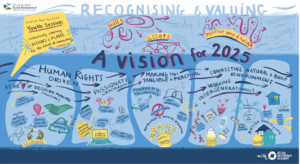“What do you do here?” is a common question we get asked as islanders from the Outer Hebrides in Scotland. Visitors from cities may regard remote, rural, and island places as backward – at times seeking such places out as empty ‘wilderness’ that is devoid of people. But we ask to what extent does such a perspective influence researchers that are working on issues of remote, rural, and island places. For example, how often are peripheral regions defined primarily by their vulnerability and disadvantage? Or how much is regional policy (like European Cohesion policy) rooted in an assumption that peripheral regions need to ‘catch up’ with more central regions?

Is this what you imagine about the Outer Hebrides? A romantic image of some long-lost past?
Rural response to COVID-19
“Historically, remote rural and island regions have been defined in terms of what they lack in relation to burgeoning urban centres”, suggests Theona Morrison, Director of CoDeL and Acting Chair of Scottish Rural Action. “Rural depopulation and aging demographic data seem to validate that rural is in decline.”
But the COVID-19 pandemic and ongoing impacts deeply challenged this perception, as demonstrated by research led by CoDeL and launched during a Regions in Recovery Global e-festival session. Despite severe economic disruptions, on balance peripheral areas performed relatively well during COVID-19. Rural areas were advanced in terms of their sustainability, and were organised and effective in responding to challenges with positive health and economic outcomes.
As Liam Glynn, Professor of General Practice (School of Medicine, Limerick University) and a practising rural GP, concluded: “the resilience shown by rural and remote communities has been a testament to their inherent engagement, cohesiveness, and flexibility. The COVID-19 pandemic has generated renewed vigour in re-imagining life on the periphery as a very attractive place for people and businesses to come, work and live.”
Interdisciplinary research shows examples of resilience
The research funded under the Northern Periphery and Arctic Programme’s innovative COVID-19 Response Call provides many examples of resilience in practice. Rural and island communities often drew on local assets and strengths, demonstrated significant flexibility and adaptation through much innovation and creativity (from technology to sustainable living), with many localised solutions involving public, private and community actors. Over half of the entrepreneurs surveyed responded that COVID-19 had brought new business opportunities – with social enterprises playing a critical role, too. Peripheral communities tapped into their generations of experience of responding and adapting, by necessity, to changes and crises. These communities turned the challenges of peripherality to their advantage during COVID-19, and even addressed critical demographic challenges pro-actively.
This is not like a mistakenly false COVID-19 test result. These conclusions draw on substantial evidence in 10 reports, based on extensive desk research, 80 interviews and 30 case studies by 20+ researchers and 14 partners (universities, public agencies, SMEs and social enterprise), across many regions (in Canada, Greenland, Iceland, Faroes, Sweden, Finland, Scotland, Ireland) and many sectors (economics, enterprise, tourism, regional development, healthcare, culture, and human rights).
Critically, the analysis was rooted in the lived experience and voices (including younger voices – see below image) of individuals in peripheral communities during the COVID-19 pandemic.
Many of the researchers involved in the project live and work in peripheral communities, mitigating the potential bias of researchers with skewed perceptions of rural, remote, and island communities. A study of such a nature is challenging traditional perspectives, calling for the very concept of peripherality to be redefined.

Poster summarising visions of young people at the virtual Scottish Rural Parliament 2021
Impacting policy on peripherality
Policy-makers are taking note. The NPA has headlined their next annual event in October “Redefining Peripherality”. The Nordic Council of Ministers has commissioned a Nordic Talk on the same theme. Regular people have noticed, too. Theona continues that “COVID-19 has radically shifted how people view the attractiveness of rural living”. “Many are fleeing cities and buying properties in rural areas and islands. This is leading to a critical housing crisis, excluding many local and young people, the next ‘economic clearance’ according to young Gaels”.
The NPA research sets out 18 recommendations for a new approach to regional policy for remote communities that builds on their own assets, strengths, opportunities and resilience factors. “Such a new paradigm places innovation in the periphery at the very centre of solutions to societies’ most pressing challenges, including the climate emergency”, explained Mads Wolff, who for 20 years has engaged in sustainable development from local to international levels.
Redefining peripherality may support continued innovation and resilience in rural and island communities. And for those of you across the globe who want to join an emerging informal network of practitioners and researchers to develop redefining peripherality in practice, please get in touch (info@codel.scot).

Thomas Fisher is a founder and Director of CoDeL, working on the Smart Islands project, the Islands Revival blog and the NPA research. He is also a facilitator and coach for the Social Enterprise Academy, delivering diverse learning programmes, including for young people. He designed community visioning workshops for island/rural communities responding to Covid, and coached social entrepreneurs starting up enterprises during Covid. Prior to settling in the Outer Hebrides, Thomas was Director for Enterprising Communities at the new economics foundation (1996-2002).
Are you currently involved with regional research, policy, and development? The Regional Studies Association is accepting articles for their online blog. For more information, contact the Blog Editor at rsablog@regionalstudies.org.